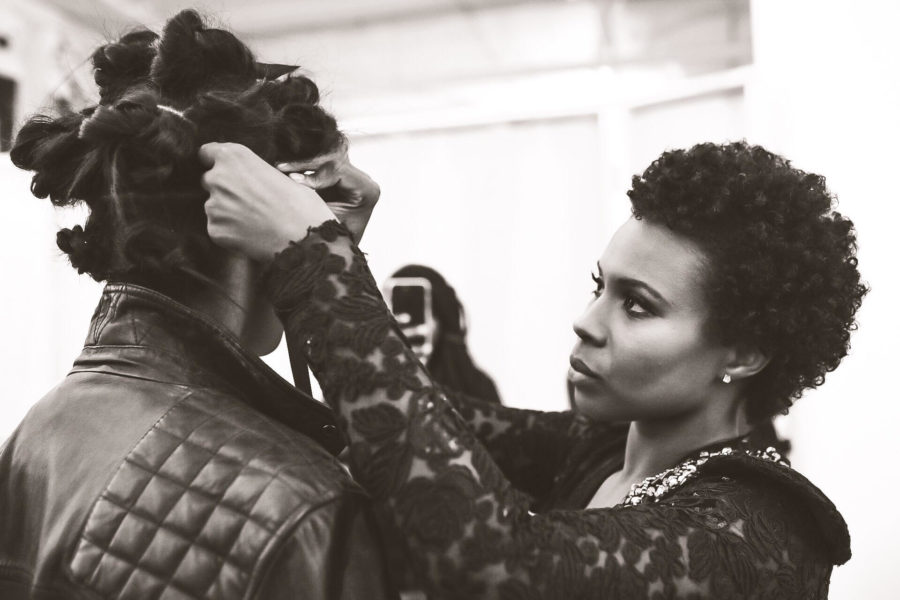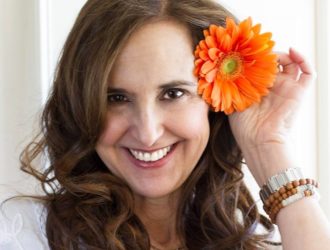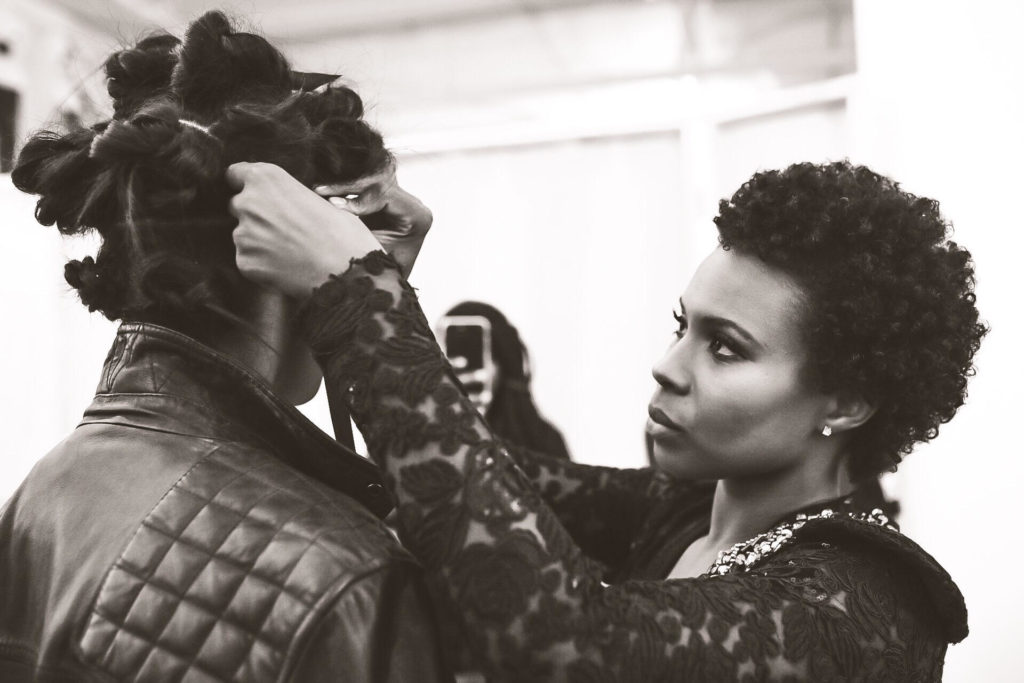
Photo: Anthony Adamick/courtesy of I Am Kréyol
Finishing touches: Joelle Jean-Fontaine making adjustments to a model wearing her I Am Kréyol designs
Not only is family a major inspiration behind Joelle Jean-Fontaine’s fashion line, I Am Kréyol, but it’s also the backbone of her business. The designer’s mother, Yolette Fontaine, was a seamstress in Haiti, and the duo are the sole producers of each and every piece of clothing in the collection. Jean-Fontaine’s brother, Stanley Rameau, is her business partner and a creative force in his own right—he’s on the verge of launching a men’s streetwear line.
I Am Kréyol designs are delectably contradictory. The clothing follows 19th-century Victorian silhouettes with full, A-line skirts and billowy, ruffled sleeves—previously worn by the bourgeois class—in vibrant hues and an eclectic mix of patterns and textures.
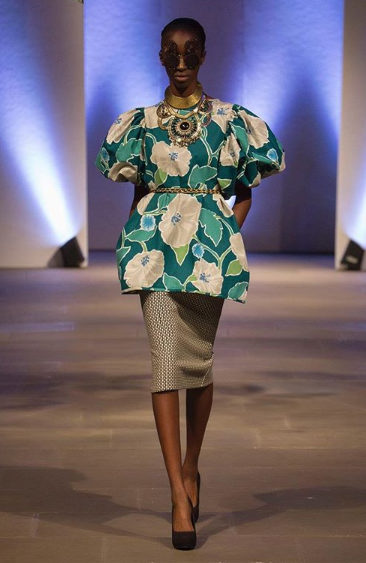
Photo courtesy of I Am Kréyol
In full bloom: A lotus flower look on the I Am Kréyol Spring 2018 runway at London Fashion Week
In a way, Jean-Fontaine’s designs are representative of her roots in Haiti, a country rich with Caribbean culture but marked by French colonialism, devastating natural disasters, and political unrest. Like her clothing, her heritage contains a beautiful storm of languages, cultures, and colors.
As she prepares to showcase her newest collection at the official opening night of Boston Fashion Week on Sept. 30, Jean-Fontaine—who has also participated in the high-profile New York and London fashion weeks—is setting her sights on expanding her business in Haiti as a way to empower local women artisans. Similar to I Am Kréyol’s mission, BFW’s kickoff event is also dedicated to the power of women.
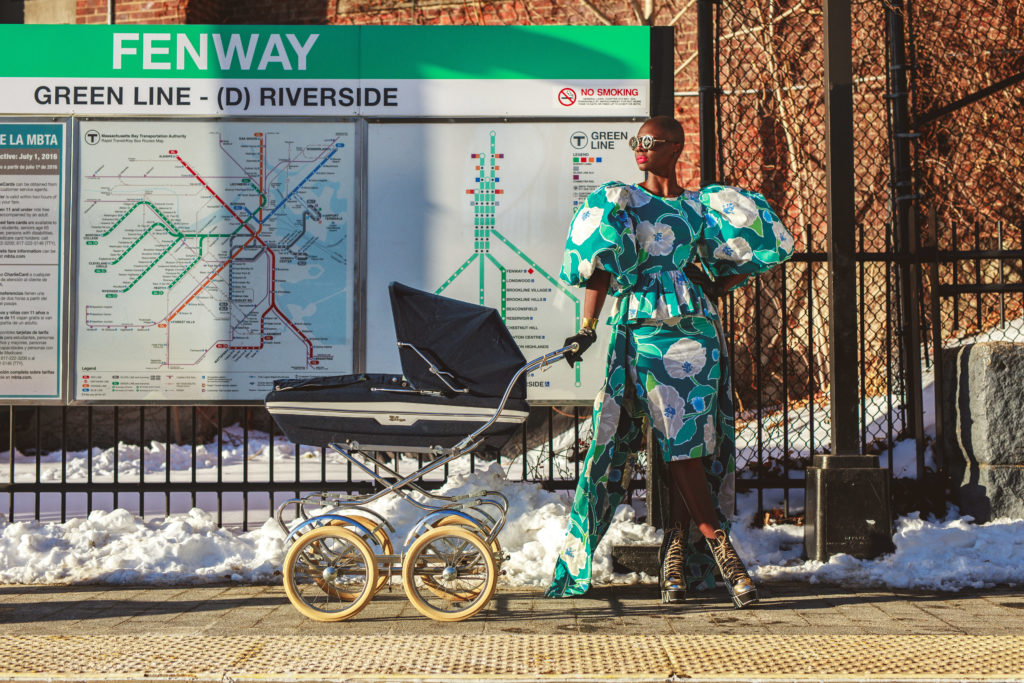
Photo courtesy of I Am Kréyol
Line drive: One of the volumionus ensembles from I Am Kréyol’s Spring 2018 collection at the Fenway T stop

Exhale: What collection will you be showing at Boston Fashion Week?
Joelle Jean-Fontaine:We’re showing a brand-new collection at Boston Fashion Week called Orange Moon. It’s a collection that coincides with the new season, the changing of the tides.
The color palette includes earth tones like deep orange, mustard yellow, and brown. We also have pieces in sky blue and our signature mix of prints with tweed and plaid.
We’ll be showing at least six looks at the show and the entire collection will have at least 10 pieces.
This time around, we’ll be doing something different. Normally, we show looks a season ahead at shows, but we’re giving the opportunity for people to order the pieces they’re seeing on the runway, right on the spot.

What are the challenges you faced in starting your own fashion line in Boston?
Being a high-fashion designer in Boston is tough. It's a collegiate town and, at times, conservative. I’m very creative and avant-garde, so I’ve had to adjust my designs to the market by toning it down a little bit.
However, I’m able to be extravagant for fashion shows and in my editorial work.
As a designer, I don’t want to narrow myself to Boston; I would like to do more work abroad. Social media has really helped me broaden my customer base from New York and Miami, all the way to Europe.

How would you describe the type of woman who wears I Am Kréyol?
Kreyol, as the language, has stigmas attached to it due to French colonialism. Kreyol was seen as the language of the poor. The first language I was taught in Haiti was French.
But I researched what Kreyol meant in general, and it turns out there are a lot of different Kreyol tribes in Africa, and they all have a bold, vibrant, and spicy aesthetic.
The Kreyol woman is bold, strong, and tenacious. Like my mother, Yolette, who emigrated from Haiti and raised us as a single mother. She has that tenacious, take-what-you-have-and-make-something-out-of-it attitude.
She taught me how to sew and has helped make clothes from the start. She always wanted to support my dream, but my dream is give her back her life, because she sacrificed so much immigrating to the U.S., and I would like to give her the option of going back home to Haiti.

Where are you in your goal to work with women artisans in Haiti? Why is it important for you to outsource production of your designs there?
The reason I wanted to start my company was to work with women in Haiti. I’d like to reconnect with Haiti; I left when I was 7 years old.
There are so many skilled artisans there who do quality work, but they don’t necessarily have avenues to make money and sustain themselves. Women in Haiti especially are often subjected to abuse, low pay, and few opportunities. My goal is to give those women options.
We were only able to raise a third of our fund-raising goal ($11,000), so in the meantime, we only have the production of our I Am Kréyol T-shirts in Haiti with three Haitian workers, in partnership with T-shirt company Caribbean Apparel.

What’s next on the horizon for I Am Kréyol?
We’re working on changing our business model into a bespoke, made-to-order model. We have the prototype designs and we customize them. The customer would sit down with us and tell us what they’re looking for and have their measurements taken. Then we have 30 days to deliver it.
Further in the future, we want to set up production in Haiti with local women. We realized not being able to raise enough money at this time was a blessing in disguise because there has been political unrest in certain areas. So we’re rethinking where we want to have production to decrease business risk.



 5 min read
5 min read